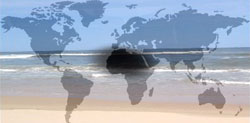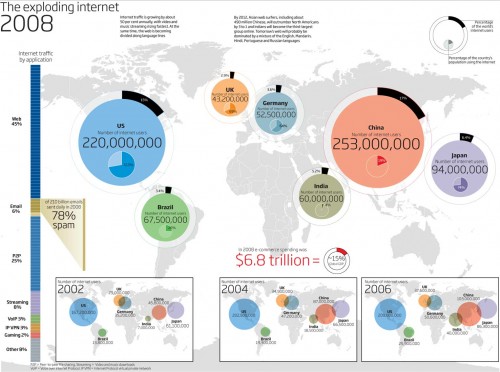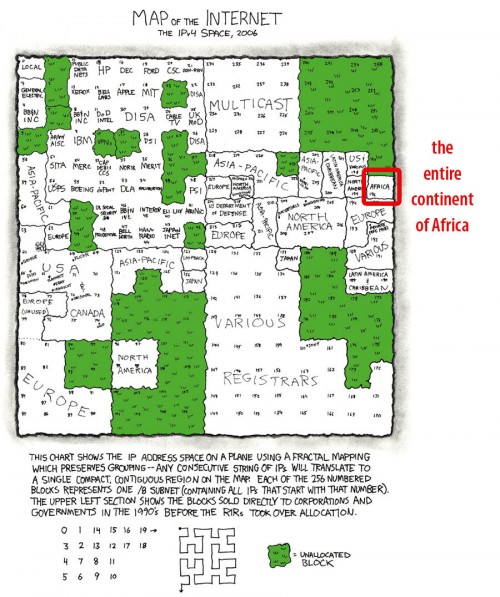 A scotoma is a blind spot in your vision. Everyone has it, and it’s due to the lack of photoreceptors where your optic nerve exits your eyeball. Normally, it’s right at the center of your vision. It’s curious to note that most maps have Africa placed squarely in the center, and most are blind to it as well.
A scotoma is a blind spot in your vision. Everyone has it, and it’s due to the lack of photoreceptors where your optic nerve exits your eyeball. Normally, it’s right at the center of your vision. It’s curious to note that most maps have Africa placed squarely in the center, and most are blind to it as well.
I’m a big fan of infographics, visualization tools that help us understand something faster than reading a long-winded explanation or a spreadsheet of data. It’s disappointed to see how Africa is usually missing from the global ones – especially in relation to technology.
I call this “Africa blindness”.
Luke Wertz linked one to me earlier today from the New Scientist on Twitter saying, “Notice anything missing from this image? Oh yea, the ENTIRE continent of Africa.”:
It’s a good graphic, really well designed and it does gets a point across. However, it’s missing two continents: Africa and Australia. Thank goodness, we’re not just dealing with Africa-blindness, but Oz-blindess too. 🙂
Here’s another great technology infographic, this time by XKCD where he’s showing the IPv4 space (that’s how you get an IP address). Note the glaringly obvious fact that the entire continent of Africa has the same-sized IP allocation as the likes of Apple and half as much as Japan.
Is there a case for Africa Blindness in tech?
A part of me can understand how a graphic designer sitting in the US or Europe, tasked with creating a graphic, would bypass Africa. After all, if you’re not from the continent, you surely don’t think of it as having much relevance in the high-tech world. On top of that, it’s not always easy to find web and mobile data in Africa as it is in the rest of the world. The first is an issue of education and media focus. The second is far more serious of a problem.
You’d think that finding aggregate information on tech in Africa would be fairly easy to find. It’s not, at least not for free like it is for much of the rest of the world. If anyone should know this, it’s me. After all, this is what I spend a great deal of time tracking…


July 20, 2009 at 7:11 pm
Africa, at least most of the continent, is irrelevant.
We have to earn our rightful place at the table.
July 20, 2009 at 8:18 pm
Quite the opposite on my part. Whenever I see a map of the globe the only place I see is Africa and then in nanoseconds my eyes do an out line of Kenya in search of Nairobi. Sure, I am good with geography and can locate all or almost all the approxi. 200 countries but my mind will switch to the other land masses on a need to know basis.
July 20, 2009 at 8:35 pm
On the relative internet / economic sub par status of Africa the reasons are two fold. First, African’s relational modes are heavy on oral and face to face communication. I am an extreme example: while I can afford a phone, any attempts to own one have never lasted more than two months for a maximum of two attempts. The only communication I do is face to face, person to person unless I have no choice (work purposes or downtime online browsing). The second reason is energy and related resource generation which, clearly, the other continents harness large quantities of energy from sources such as coal, nuclear, hydro, and so on and have enormous infrastructure systems on which their information age sits.
July 20, 2009 at 8:40 pm
@African – I can understand your personal reasons on the tech-side of things. However, I can’t help but point out the massive amounts of natural energy resources that a number of African nations sit upon (oil, natural gas).
July 20, 2009 at 9:24 pm
I think that the greater problem is in the fact that most all of these charts are compiled by folks in the US and the US loves, loves, loves numbers. As opposed to looking at the lump base of users (which is important, but not definitive), they should actually be looking at the percentage of user growth. When you take that in to account, you would see that the US would be nearly flat when compared to a place like say, South Africa or other African nations taken in relation to the total number of users from the previous year to measure the actual growth of the user base. Africa has fantastic growth year after year and why few are paying attention to that, is the bigger question of blindness. I suppose it’s because few investors want to put their money in the continent even to this date, although it’s the place where real business is going to happen over the next decade.
On a more personal note, these statistic questions are annoying to me personally as I get asked them about my projects all the time to which I’ve just started responding, “Oh, we have 230 million users. We’re just staying ahead of Facebook. Why do you ask?” Rarely have I seen any numbers question turn in to any kind of interesting conversation, although I’m still trying to keep an open mind.
As to the IP mapping chart, it would be a lot more fair if people tracked which VSAT IPs that are currently linked with Europe are actually the front for African traffic. I know that friends in Liberia appear as being from Israel or England and when I was in Congo, I appeared to be from Belgium or Italy (if at a UN office.) This will sort out better once all of this new cable comes online.
-miquel
July 21, 2009 at 5:38 am
Is it the lack of media focus on Africa? I doubt it. I think it’s more of an issue of the businesses, people & organizations who are on the ground not making information available. I personally wonder if this is an issue of accountability. Another reason why westerners & the rest of the world are so uneasy about engaging Africa. There’s no info, b/c there is no accountability. Bill Easterly has made his name of late on this issue. Aid organizations (gov’t, UN & private) don’t do it or they do it while grumbling and even then only in one language on a piece of paper you have to go pick up in their office of who knows where. In other words, they make it as difficult as possible to access if it even exists.
And on the other hand we have businesses that are corrupt. We can argue a lot about how much corruption by private or public individuals impacts the free market, but the reality is that the rest of the world won’t engage when they don’t feel safe about how their money is being used, when information isn’t available, when maps without any info on Africa keep popping up.
Kind of looks like it’s taking on a chicken and egg scenario.
I tend to think it’s more an issue of your first note, education. Media focuses in on what people want to hear. If the population isn’t educated, they’ll just listen to what’s cool instead of what is reality. Another chick/egg problem. Which comes first? I know the idea is that media educates, but that’s some of the problem. Real, actual, book & school education is needed. Quality media should follow. We shouldn’t rely solely on the media to educate us.
Dare I say it’s a case of branding? A conversation is happening on twitter #brandafrica discussing all kinds of issues. Who is branding Africa? How should it be branded? What should be branded? Should it be branded as 1 or as 53 countries?
Perhaps I’m going off a bit off topic, but I feel like all these issues (and many, many more) play into your theory of ‘Africa Blindness’.
July 21, 2009 at 6:35 am
The dark spot in the first graphic could either be a blind spot or a black hole – from which information can never hope to escape. @miquel has a good point about numbers… No ones really compiled accurate numbers on Africa, making it difficult to compare it to the rest of the world. Without numbers, investors are less likely to be attracted to what is otherwise a potentially huge return on investment.
Branding is critical, but ultimately information sharing between African countries will lead to greater transparency which makes Africa easier to ‘sell.’
July 22, 2009 at 4:54 am
I think the glass is half full. The question, for me, is not why there is blindness, (since there is), it is, what am I doing to take advantage of the current situation because we know the blindness will lift?
We are already seeing the lifting in some areas. There is a sizable amount of work going into outsoursed content creation in these parts of the world, and we are quickly going to get into a human resource problem.
Say, the fiber optic kicks in by the end of next week (SEACOM is on the 23rd July 09, but hey?) , are we ready for the opportunities that will be staring at us in the eyes, once we shut our mouths after the celebrations?
July 22, 2009 at 10:25 pm
I don’t think it is an issue of data. The Data is available. google “Internet users in Africa” and you will have some data to work with.
Africa is sometimes referred to as the dark continent but pretty soon it will be in the light.
July 30, 2009 at 4:02 am
I don’t understand your frustration. You’re comparing a continent to individual countries. The above graphics just lists 7 top countries, non of them is in Africa or Australia. If Africa would be one country, then we would see much different maps:)
August 8, 2009 at 11:51 am
Why wouldnt Africa use such little internet when more than 50% of its population is under the age of 15, when 60-70% of its population is in rural areas, when GDP per capita is under $1000 in most countries (not enough disposable income for computers) ?
The disparity is even worse when you exclude North Africa and South Africa. After all, while at AfriNIC (the African registry) I wrote software that auto-generated charts on IPv4 resource usage (www.afrinic.net/statistics) and you find that South Africa ALONE accounts for 60% of IPv4 usage with Egypt, Tunisia, Algeria accounting for another 15% or so. Those countries happen to be highly urbanized, have much higher per capita income than much of Africa and have inexpensive fibre connectivity to the rest of the world.
On the bright side African countries can catch up with the rest of the world as long as they invest in all the associated infrastructure like power, fibre connectivity, like teaching computers in schools, like training on open-source technologies. The growth of mobile shows that there is a demand in the African market for technology like anywhere else and having a young population can only be an asset for the rise of the internet because the young are everywhere eager and ready to learn.
September 1, 2009 at 8:39 am
Africa can score higher in Technology. If the fundamentals are taught at an early age, a lot of ideas currently expressed in the free industry could all be done through technology.